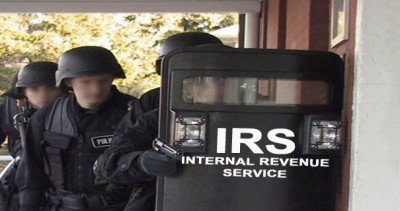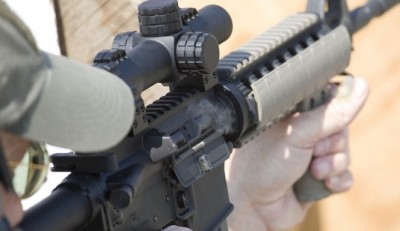|
Listen To The Article
|
IRS agents have been armed with AR-15s and are actively training to use the semi-automatic rifles, according to South Carolina Congressman Jeff Duncan. During a tour of the Maryland Department of Homeland Security (DHS) Training Facility, the Republican lawmaker witnessed IRS agents with AR-15s. The tour of the DHS facility was conducted as a part of Duncan’s investigation into the copious amounts of ammo the federal agency has been purchasing.
Representative Jeff Duncan recently shared the IRS AR-15s story with the American public via Twitter. Duncan’s tweets read:
“A few weeks ago when I toured a DHS facility I saw IRS agents training with AR-15s. I’m looking into the issue now. There are many reasons to ask why IRS needs heavy firepower. For one we’re 17 trillion in debt. Two, is it even appropriate? #PJNET”
During an interview with a WYFF News Channel 4, Jeff Duncan went on to note that he saw about nine shooters practicing at an indoor 100-yard range. The South Carolina Congressman was told that the shooters were IRS agents. The Republican also had this to say about the baffling discovery of armed IRS agents:
“Why do IRS law enforcement agents need standoff capability that you would have with a long rifle or with a weapon similar to an AR-15? They’re generally investigating tax evasion, fraud, and money laundering. We think of the IRS as an audit agency more than doing the type of law enforcement where they have to use an AR-15. While we were sitting there, the gentleman told them to sling their weapons and load a 30-round magazine into the AR-15s they were training with.”
If the IRS needs the assistance to bring a “tax villain” to justice, they have the services of a SWAT team and the FBI at their full disposal. There is no logical reason to spend taxpayer money training an unnecessary armed IRS force. Mark Green, a spokesman for the federal agency did confirm that agents do train at the Maryland facility. The IRS representative would not comment further on the matter, citing firearms training operations security dictates.
The Tea Party and other patriot groups targeted by the IRS will probably sleep a little less soundly now that they know their nameless reviewers might be very well-armed. Will the agents be ordered to use their stand-off capacity weapons against rowdy Obamacare protestors or folks who neglect to empty their pockets on tax day each year?
Everything You Need To Know To Keep Your Home And Family Safe.
Liberals argue that AR-15 rifles are military style weapons and should only be in the hands of soldiers. The Internal Revenue Service does have a law enforcement division, but the stated primary mission of the group is to serve the public by investigating possible tax code crimes – not exactly a “Dirty Harry” type career. The job description for the IRS law enforcement branch reads:
“A Career In Action! As an IRS Criminal Investigation (CI) Special Agent, you will pull together your accounting and law enforcement skills. CI special agents are duly sworn law enforcement officers who investigate complex financial crimes associated with tax evasion, money laundering, narcotics, public corruption, and much more. Are You Ready For The Challenge? IRS special agents must follow strict procedures to initiate an investigation and recommend prosecution to the Department of Justice. These procedures include approval by several IRS officials to ensure investigations are based on factual evidence that tax fraud or another financial crime has occurred.”
 According to IRS statutes, a special agent’s authority to carry a firearm is “implied” from the power to makes seizures and arrest as outlined in 26 USC7608b. The use of deadly force by IRS agents statute reads:
According to IRS statutes, a special agent’s authority to carry a firearm is “implied” from the power to makes seizures and arrest as outlined in 26 USC7608b. The use of deadly force by IRS agents statute reads:
- Use of deadly force is permitted only when necessary and if in the considered opinion of the special agent, either the special agent or another person is in imminent danger of loss of life or serious physical injury.
- “Imminent” has a broader meaning than “immediate” or “instantaneous.”
- A subject may pose an imminent danger even if he/she is not at that very moment pointing a weapon at the agent.
- Deadly force may be used to prevent the escape of a fleeing subject if there is probable cause to believe the subject has committed a felony involving the infliction or threatened infliction of serious physical injury or death and the escape of the subject would put the special agent or others in imminent danger of serious physical injury or death.
- Special agents may direct deadly force against dogs or other vicious animals when necessary for self-defense or the defense of others.
- Special agents must conceal their handguns upon their persons, keeping them away from public view when conducting official business. However, special agents may display their handguns, if they feel it will relieve a threat against special agents or others.
- Warning shots are prohibited due to the risk they pose to innocent parties. In addition, warning shots can communicate to fellow agents/officers that the use of deadly force is warranted, leading to improper reactions.
- Special agents detailed and/or temporarily assigned to another Federal law enforcement agency, will follow the policies and guidelines promulgated by that agency (e.g., temporary Air Marshal, Secret Service details, etc.)
- Special agents detailed and/or assigned to multi-agency task forces will continue to follow IRS-CI policies and guidelines (e.g., JTTF, OCDETF, HIDTA, etc.)
Only terms like “intermediate weapons,” “weaponless control,” and use of handguns are used in posted duties and procedures manual – AR-15 style rifles are not noted at all. The vagueness of what actually constitutes imminent danger is more than a bit disconcerting. But the fact that the Department of Homeland Security or the Department of Justice could potentially “call up” IRS agents for special assignment is outright frightening.
The checks and balances cleverly built into our governmental system are further eroded by such agent sharing. Another IRS criminal investigation statute notes that an agent’s authority and responsibility in respects to crimes committed outside the agency’s jurisdiction. The ongoing scandals surrounding the Obama administration has generated the highest level of government distrust since the Nixon administration. The co-mingling between federal agencies THAT could be called upon to one day investigate each other does not restore a shred of integrity to Barack Obama’s presidency.
Why does the IRS need such heavy firepower?youtu.be/TzHzqpNQNJ4 #PJNET #tcot
— Rep. Jeff Duncan (@RepJeffDuncan) June 13, 2013
 Off The Grid News Better Ideas For Off The Grid Living
Off The Grid News Better Ideas For Off The Grid Living





